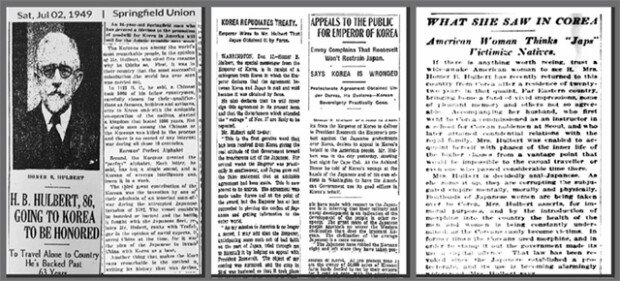‘Koreans are among the world’s most remarkable people,’ Hulbert says
‘Koreans are among the world’s most remarkable people,’ Hulbert says
Posted October. 29, 2019 09:13,
Updated October. 29, 2019 09:13

Having prepared himself for death, Homer B. Hulbert (1863-1949) took a train that went across the Yalu River on Aug. 30, 1909. Even a revolver he had bought in Berlin for self-protection could not take away his anxiety. He had already left a will to his wife in the United States about how to deal with his possessions and nurture their children after his death. He had to go back to Seoul to take care of housework and his books, Hulbert said. Most of all, he missed Seoul so much.
Japan had pointed Hulbert as the mastermind of the Hague Secret Emissary Affair two years ago. When the international conference opened in the Hague, Hulbert was dispatched as Emperor Gojong’s secret envoy carrying the emperor’s letters to the representatives of each country. His every move was watched and monitored by the Residency-General and the Ministry of Foreign Affairs of Japan. In his home country, Hulbert also made efforts to publicize Japan’s atrocities and acts of aggression.
A book about the life of Hulbert has been newly published. The author Kim Dong-jin, who wrote his first book about the American missionary in 2010, has tracked and collected materials related to Hulbert over the past 10 years and added more contents. Hulbert’s will was obtained from his granddaughter.
“Koreans are among the world’s most remarkable people.”
This was what Hulbert said during an interview with Springfield Union in July 1949. It may have sounded absurd as Korea back then was one of the poorest countries in the world that gained its independence only recently. However, Hulbert was more than confident in saying so.
The book also introduces a New York Times article published in December 1905 that says Hulbert received a telegram from Korea “in which the Emperor declares that the agreement (the Eulsa Treaty) between Korea and Japan is null and void because it was obtained by force.” Emperor Gojong also said that “he will never sign this agreement in its present form.” This telegram serves as actual evidence that proves the emperor declared the invalidity of the treaty, the author said.
An interview of Mrs. Hulbert in which she accused Japan of invading Korea was also revealed by the book. Mrs. Hulbert, in an article published in May 1910 by the New-York Tribune, testified that “the upper class of Korea is humiliated by the upper class of Japan, while Korean laborers are spending days in great pain, being beaten by Japanese laborers.”
Jong-Yeob JO jjj@donga.com







